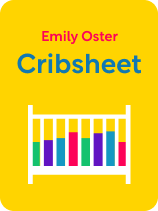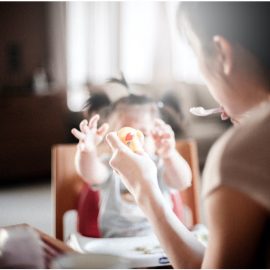

This article is an excerpt from the Shortform book guide to "Cribsheet" by Emily Oster. Shortform has the world's best summaries and analyses of books you should be reading.
Like this article? Sign up for a free trial here.
How can you make your parenting decisions less stressful? What is economic reasoning?
Emily Oster specializes in health economics and wrote Cribsheet to show the ways data can inform your parenting decisions. Oster’s findings in Cribsheet are relevant for any parents of young children and soon-to-be parents seeking advice on making research-informed, less stressful parenting decisions.
Read on to learn how Oster says you can stress less over parenting decisions with economic reasoning.
Parenting Decisions & Economic Reasoning
Oster argues that the best way to overcome the stress of parenting decisions is to apply wisdom from economics to your choices. Economics includes the study of how people make decisions under constraints. Ideas from this field, which we’ll call economic reasoning, improve your parenting decisions in two ways.
First, economic reasoning helps you determine how to make a decision, rather than what to decide. This assists you in making a decision that’s best for your situation, instead of what’s best for other people’s situations.
(Shortform note: Oster’s advice to make a decision that’s best for you, even if it’s not what others have decided, may be easier to follow in some cultures than in others. Cultures exist on a spectrum from having “tight” social norms to having “loose” social norms. If you live in a “tight” culture, such as Germany or Pakistan, people expect you to conform to social norms. In these countries, you may feel less comfortable taking an unconventional parenting approach. By contrast, if you live in a “loose” culture, such as Brazil or New Zealand, it’s more common and acceptable to deviate from social norms.)
Second, economic reasoning helps you better interpret data so you can feel more confident you’ve made an informed decision. Data clarify many of the risks and benefits associated with different parenting decisions, and economic reasoning helps you weigh these risks and benefits in the context of your life. This process can leave you feeling confident that you’re making a thoughtful, well-informed decision.
(Shortform note: You’ll likely feel even more confident in your parenting decisions if you try to counteract your confirmation bias while encountering data. As Dan and Chip Heath explain in Decisive, confirmation bias is our tendency to seek out and favor information that supports our existing beliefs. The Heaths claim that you can counteract this bias by seeking out information that contradicts your beliefs. For instance, imagine you’re deciding whether to allow visitors to see your newborn. You believe that this could make your infant sick by exposing them to germs. To counteract your confirmation bias, seek out research that supports the opposite conclusion: that exposing your newborn to germs increases their immunity to sickness.)
In this article, we’ll explore two economic reasoning concepts and explain how they improve your decision-making.
Concept 1: Risk Assessment
According to Oster, the economic concept of risk assessment helps you determine whether a parenting decision is worth its risks. When you conduct a risk assessment, you compare the risks of an option’s outcomes to other risks you regularly, automatically make (such as giving your child solid food even though there’s a risk of choking). This comparison puts the risks of a parenting decision into perspective: You’ll know how much (or how little) you need to fear a risk based on how much you already fear the existing risks in your life.
For example, imagine you’re considering whether it’s safe to give your infant a vaccine for the rotavirus (a virus that causes diarrhea). Statistics show that 1 in 100,000 infants who receive the rotavirus vaccine experience a serious intestinal obstruction. Let’s compare this risk to a risk most parents regularly take with their infants: bringing them in the car. In 2020, 53 US infants out of a population of 3,735,101 (1.4 in 100,000 infants) died in a car accident. Comparing these two risk statistics reveals that the risk of a serious reaction to the rotavirus vaccine is very low. You know to fear the rotavirus vaccine less than bringing your baby in the car.
(Shortform note: A major benefit of conducting a risk assessment is that it forces you to make a more rational decision, rather than one colored by your emotional state. Research reveals that your emotional state influences to what extent you see an option as beneficial or risky. When you’re experiencing negative emotions, you’re more likely to see an option as high-risk. Taking time to consider data on an option’s risk, as Oster proposes, provides you with objective information that can help counteract the ways your emotions distort risks.)
Concept 2: Opportunity Cost
Furthermore, Oster claims that it’s worthwhile to consider a parenting decision’s opportunity cost: what you’d miss out on by choosing that option. This helps you identify an option’s downsides. For instance, imagine you’re deciding whether to breastfeed your baby (which can be inconvenient) or feed them with formula (which can be expensive). Purchasing a year’s worth of baby formula will cost you close to $1,300 more than breastfeeding. Consider what else you could do with $1,300, such as travel.
(Shortform note: While considering opportunity costs helps you identify the downsides of an option, Barry Schwartz argues in The Paradox of Choice that considering opportunity costs can also overwhelm you. Because there’s often an overabundance of options for a single decision, it can be stressful to weigh the opportunity costs for each option. Furthermore, considering opportunity costs may lead you to experience regret: After you make a decision, you may obsess over what you could have done instead. In a later section, we’ll explore how to avoid this overwhelming stress and regret.)
Refrain From Harsh Self-Judgment
Finally, Oster urges you to refrain from harsh self-judgment any time you make a decision that defies conventional wisdom or that other parents are likely to judge as “wrong.” Others’ judgments, which you may internalize as self-judgment, are based on the false idea that there’s only one right way to parent. Instead, reassure yourself that you’ve made an informed, thoughtful decision that’s right for you, your child, and your budget.
(Shortform note: Harsh self-judgments may take the form of an “inner critic.” One psychologist recommends you counteract your inner critic’s judgments using this strategy: Write down what the inner critic “says,” and then write back with a more realistic, generous opinion about yourself. For example, imagine you decide to breastfeed your baby in public, an act that some people judge as inappropriate. Your inner critic may reflect this stigma, telling you it’s indecent to breastfeed in public. Respond in writing by reminding yourself why you decided to do it. For instance: “Breastfeeding in public is legal where I live, and I find it more convenient than seeking out a private space to breastfeed. Besides, I want to help destigmatize public breastfeeding.”)

———End of Preview———
Like what you just read? Read the rest of the world's best book summary and analysis of Emily Oster's "Cribsheet" at Shortform.
Here's what you'll find in our full Cribsheet summary:
- Why there isn't one right way to parent a young child
- How to make research-based parenting decisions
- When you should start potty training your toddler






